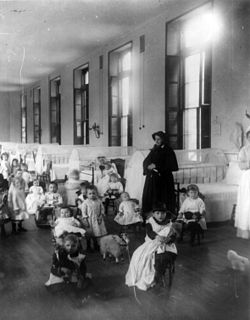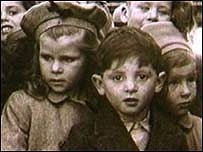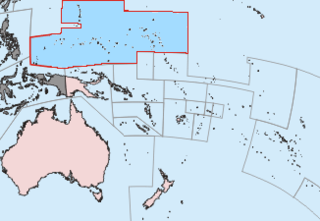
The prime minister of Japan is the head of the executive branch of the government of Japan. The prime minister directs the National Cabinet and is the commander-in-chief of the Japan Self-Defense Forces; he is appointed by the emperor of Japan after being designated by the National Diet and must enjoy the confidence of the House of Representatives to remain in office. He is the head of the Cabinet and appoints and dismisses the other ministers of state. The literal translation of the Japanese name for the office is Minister for the Comprehensive Administration of the Cabinet.

Adoption is a process whereby a person assumes the parenting of another, usually a child, from that person's biological or legal parent or parents. Legal adoptions permanently transfer all rights and responsibilities, along with filiation, from the biological parents to the adoptive parents.

Teriyaki is a cooking technique used in Japanese cuisine in which foods are broiled or grilled with a glaze of soy sauce, mirin, and sugar.
A single parent is a person who lives with a child or children and who does not have a spouse or live-in partner. Reasons for becoming a single parent include divorce, break-up, abandonment, domestic violence, rape, death of the other parent, childbirth by a single person or single-person adoption. A single parent family is a family with children that is headed by a single parent.
The Gentlemen's Agreement of 1907 was an informal agreement between the United States of America and the Empire of Japan whereby Japan would not allow further emigration to the United States and the United States would not impose restrictions on Japanese immigrants already present in the country. The goal was to reduce tensions between the two Pacific nations such as those that followed the Pacific Coast race riots of 1907 and the segregation of Japanese students in public schools. The agreement was not a treaty and so was not voted on by the United States Congress. It was superseded by the Immigration Act of 1924.
Kenpō is the name of several arts. The word kenpō is a Japanese translation of the Chinese word "quánfǎ". This term is often informally transliterated as "kempo", as a result of applying Traditional Hepburn romanization, but failing to use a macron to indicate the long vowel. The generic nature of the term combined with its widespread, cross-cultural adoption in the martial arts community has led to many divergent definitions. The word Kenpō translates thus: "Ken" meaning 'Fist' and "Po" meaning 'Method' or 'Law' as in 'Law of gravity', a correct interpretation of the word Kenpō would be 'Fist Method', the same meaning as 'Quanfa'. However, it is often misinterpreted as 'the Law of the Fist'.

Foster care is a system in which a minor has been placed into a ward, group home, or private home of a state-certified caregiver, referred to as a "foster parent" or with a family member approved by the state. The placement of the child is normally arranged through the government or a social service agency. The institution, group home, or foster parent is compensated for expenses unless with a family member. In some states, relative or "Kinship" caregivers of children who are wards of the state are provided with a financial stipend.

The adoption of children by lesbian, gay, bisexual, transgender (LGBT+) people may be in the form of a joint adoption by a same-sex couple, adoption by one partner of the other's biological child, or adoption by a single LGBT+ person. Joint adoption by same-sex couples is legal in twenty-seven countries as well as several subnational jurisdictions and dependent territories. Furthermore, some form of step-child adoption is legal for same-sex couples in five additional countries.
The international adoption of South Korean children was at first started as a result of a large number of orphaned mixed children from the Korean War after 1953, but later included orphaned Korean children. Religious organizations in the United States, Australia, and many Western European nations slowly developed into the apparatus that sustained international adoption as a socially integrated system. This system, however, is essentially gone as of 2020. The number of children given for adoption is lower than in comparable OECD countries of a similar size, the majority of adoptees are adopted by South Korean families, and the number of international adoptees is at a historical low.

Kanchō (カンチョー) is a prank performed by clasping the hands together in the shape of an imaginary gun and attempting to poke an unsuspecting victim's anus, often while exclaiming "Kan-CHO!". It is a common prank among children in East Asian countries such as Japan. In Korea, it is called ddongchim. In China, it is popularly called qiānnián shā (千年殺), which was derived from the jutsu technique in the manga and anime series Naruto. The word is a slang adoption of the Japanese word for enema. In accordance with widespread practice, the word is generally written in katakana when used in its slang sense, and in kanji when used for enemas in the medical sense.

Before World War II, the Imperial Japanese Navy began construction of various airfields, fortifications, ports, and other military projects in the islands controlled under the South Seas Mandate. It was from these fortifications in Palau, the Carolines and the Marshall Islands that a significant portion of the Japanese Navy disembarked towards the Philippines, New Guinea, Nauru and the Gilbert Islands during 1941–42 in the Pacific War.
The main family law of Japan is Part IV of Civil Code. The Family Register Act contain provisions relating to the family register and notifications to the public office.

This is a gallery of international and national flags used in Asia.

A same-sex relationship is a romantic or sexual relationship between people of the same sex. Same-sex marriage refers to the institutionalized recognition of such relationships in the form of a marriage; civil unions may exist in countries where same-sex marriage does not.
Maruha Nichiro Corporation is a Japanese seafood company, beginning its operation in 1880, when its founder, Ikujiro Nakabe, began a fish sale business in Osaka. The company is the largest of its kind in Japan, with Nippon Suisan Kaisha and Kyokuyo Co., Ltd. as its main competitors.
Adult adoption is a form of adoption between two or more adults in order to transfer inheritance rights and/or filiation. Adult adoption may be done for various reasons including: to establish intestate inheritance rights; to formalize a step-parent/step-child relationship or a foster parent/foster child relationship; or to restore the original legal relationship between adult adoptees and their natural families.

The permanent members of the United Nations Security Council are the five sovereign states to whom the UN Charter of 1945 grants a permanent seat on the UN Security Council: China, France, Russia, the United Kingdom, and the United States.
Until 2017, laws related to LGBT+ couples adopting children varied by state. Some states granted full adoption rights to same-sex couples, while others banned same-sex adoption or only allowed one partner in a same-sex relationship to adopt the biological child of the other. Despite these rulings, LGBT+ people and same-sex couples still face discrimination when attempting to foster children.
Japanese adult adoption is the practice in Japan of legally and socially accepting a nonconsanguineal adult into an offspring role of a family. The centuries-old practice was developed as a mechanism for families to extend their family name, estate and ancestry without an unwieldy reliance on blood lines. Still common today, adult adoption is a dynamic tool for social and economic mobility.
National Cat Day is celebrated in various countries. In some areas it is an awareness day to raise public awareness of cat adoption.









